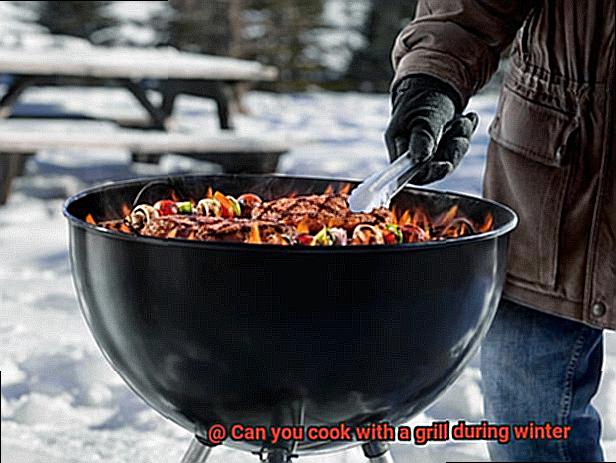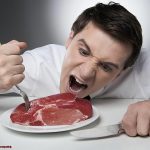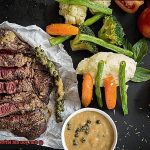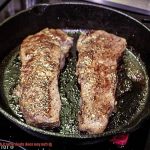Do you pack away your grill at the first sign of winter? Do you think it’s too cold outside to cook with it? Well, let me tell you something – winter grilling is a thing. Have you ever tasted smoked turkey on Thanksgiving or grilled ribs for your holiday dinner? If yes, then you already know the answer to the question “Can you cook with a grill during winter?” The answer is a resounding YES.
In recent years, more and more people are embracing winter grilling. Why not add some excitement to your cooking routine and enjoy the crisp winter air while doing so? Winter grilling is not just about the food; it’s also an opportunity to bond with family and friends over stories and memories.
But before you rush out to fire up your grill, there are some things to consider. In this blog post, we’ll explore the benefits of winter grilling and the challenges that come with it. We’ll also provide tips to make your winter grilling experience a success. So, let’s get started on this journey into the world of winter grilling.
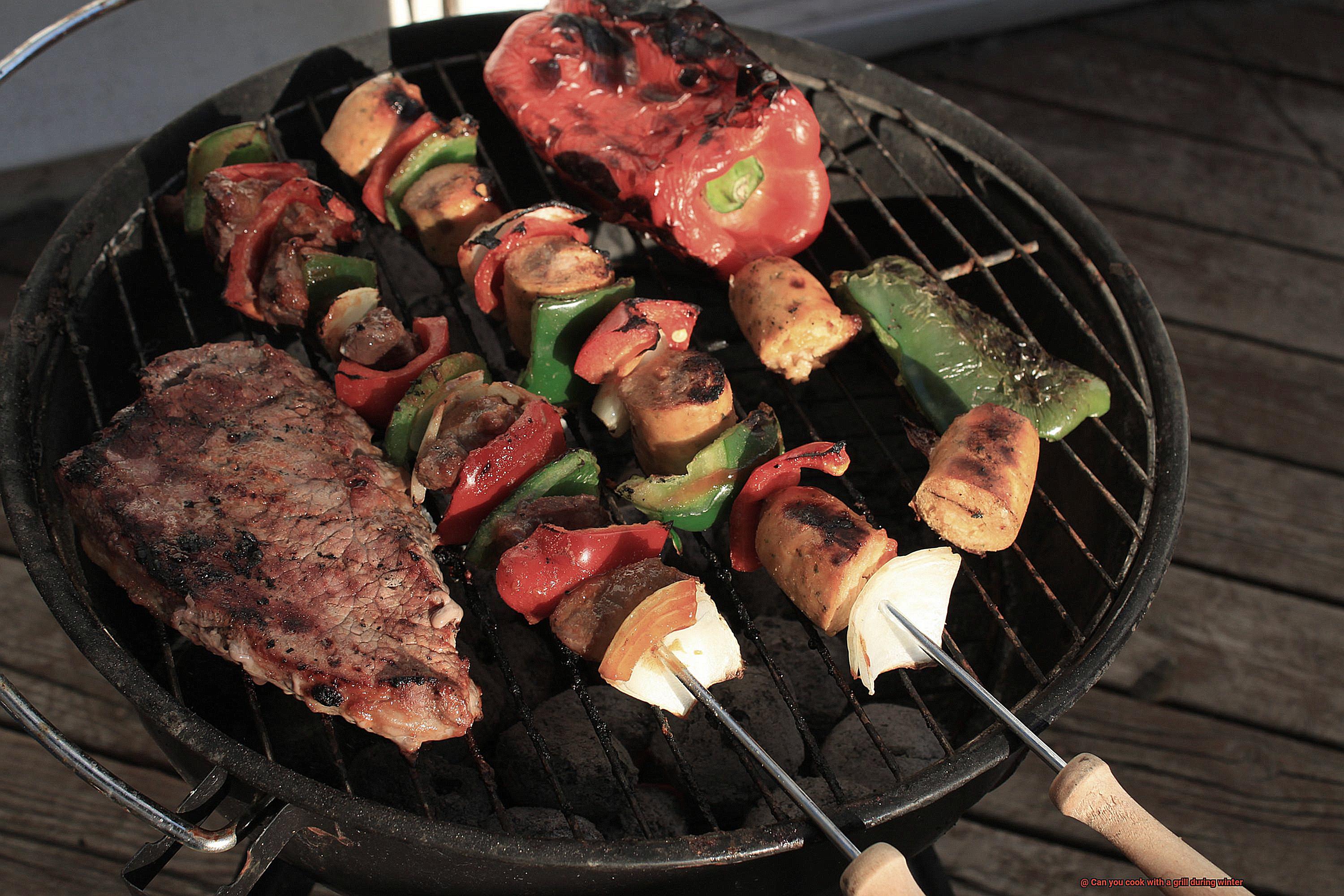
Contents
Can You Cook with a Grill During Winter?
The good news is that it’s absolutely possible, but get ready to face some unique challenges that come with grilling in cold weather.
One of the major concerns when it comes to winter grilling is the temperature outside. Frigid temperatures make it difficult for the grill to maintain a consistent cooking temperature, resulting in unevenly cooked food and longer cooking times. To overcome this challenge, consider investing in a grill with a thicker cooking grate and a lid that can retain heat better. These features will help your grill maintain its temperature and cook your food evenly.
Another challenge you may encounter when grilling in winter is dealing with snow and ice. Before firing up your grill, make sure that the area around it is cleared of any snow or ice. This will prevent any accidents from occurring while carrying hot food to and from the grill. You should also invest in a durable grill cover to protect your equipment from the elements when not in use.
When it comes to fuel, propane and natural gas grills are typically easier to use in the winter because they don’t require as much time to heat up as charcoal grills do. However, if you prefer the smoky flavor that charcoal provides, be prepared to give yourself extra time for your grill to heat up and keep an eye on the coals as they may burn faster in colder temperatures.
To ensure that your food is cooked thoroughly, use a meat thermometer. This simple tool will provide you with an accurate reading of the internal temperature of your food and help prevent undercooked or overcooked meals.
If you’re considering winter grilling, here are some tips to keep in mind:
- Plan for extra time in your cooking process due to colder temperatures.
- Invest in a high-quality grill with a thick cooking grate and a lid that can retain heat better.
- Clear the area around your grill of snow and ice before grilling to ensure safety.
- Use a durable grill cover to protect your equipment from the elements.
- Consider using propane or natural gas grills for ease of use, or be prepared to give yourself extra time for your charcoal grill to heat up.
- Use a meat thermometer to ensure your food is cooked thoroughly.
Challenges of Grilling During Winter
The cold temperatures, snow, and ice pose significant challenges to outdoor cooking. However, with a little preparation and knowledge, you can overcome these challenges and enjoy delicious grilled food all year round.
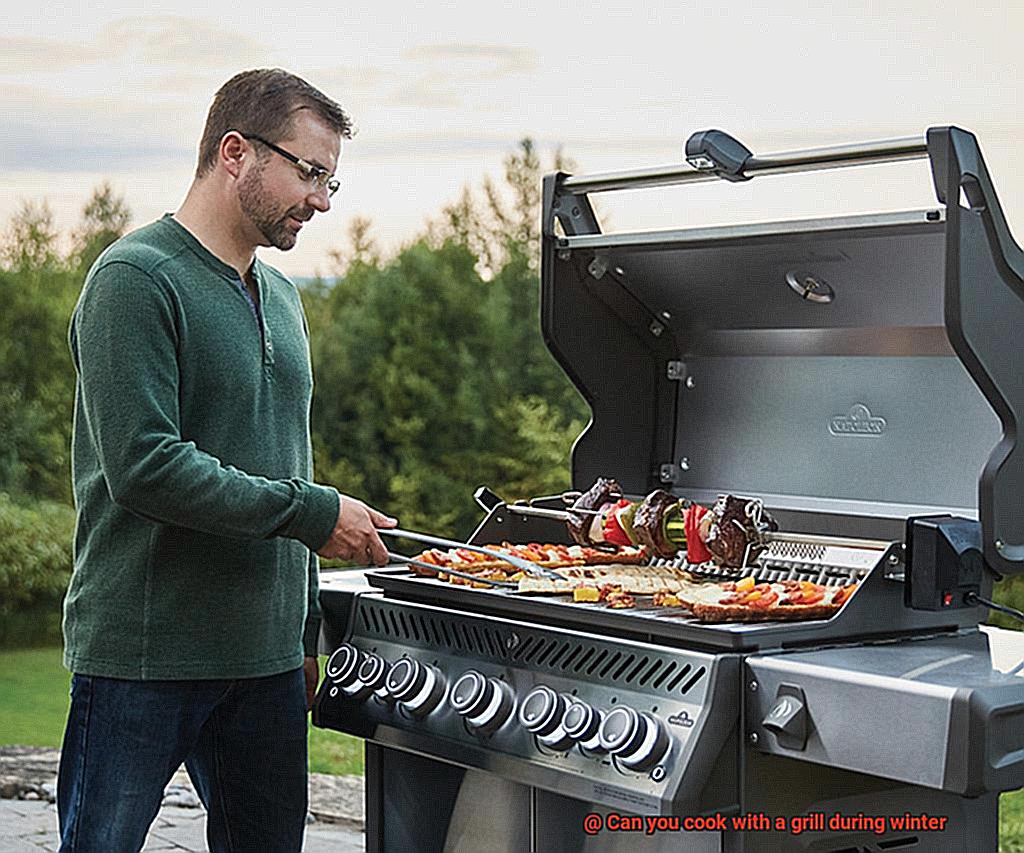
The first challenge of grilling during winter is keeping the grill at a consistent temperature. The cold weather can cause the grill to lose heat quickly, making it difficult to cook food evenly. This issue is even more prevalent with charcoal grills that generally take longer to warm up than propane or natural gas grills. To overcome this obstacle, invest in high-quality grills with thick cooking grates and lids that retain heat better. This will help maintain a consistent temperature throughout the cooking process.
Another challenge of grilling during winter is dealing with snow and ice buildup on the grill. This can cause problems with the ignition system and make cleaning it a hassle. To prevent this issue, clear the area around your grill before cooking and invest in durable covers that protect your grill from the elements.
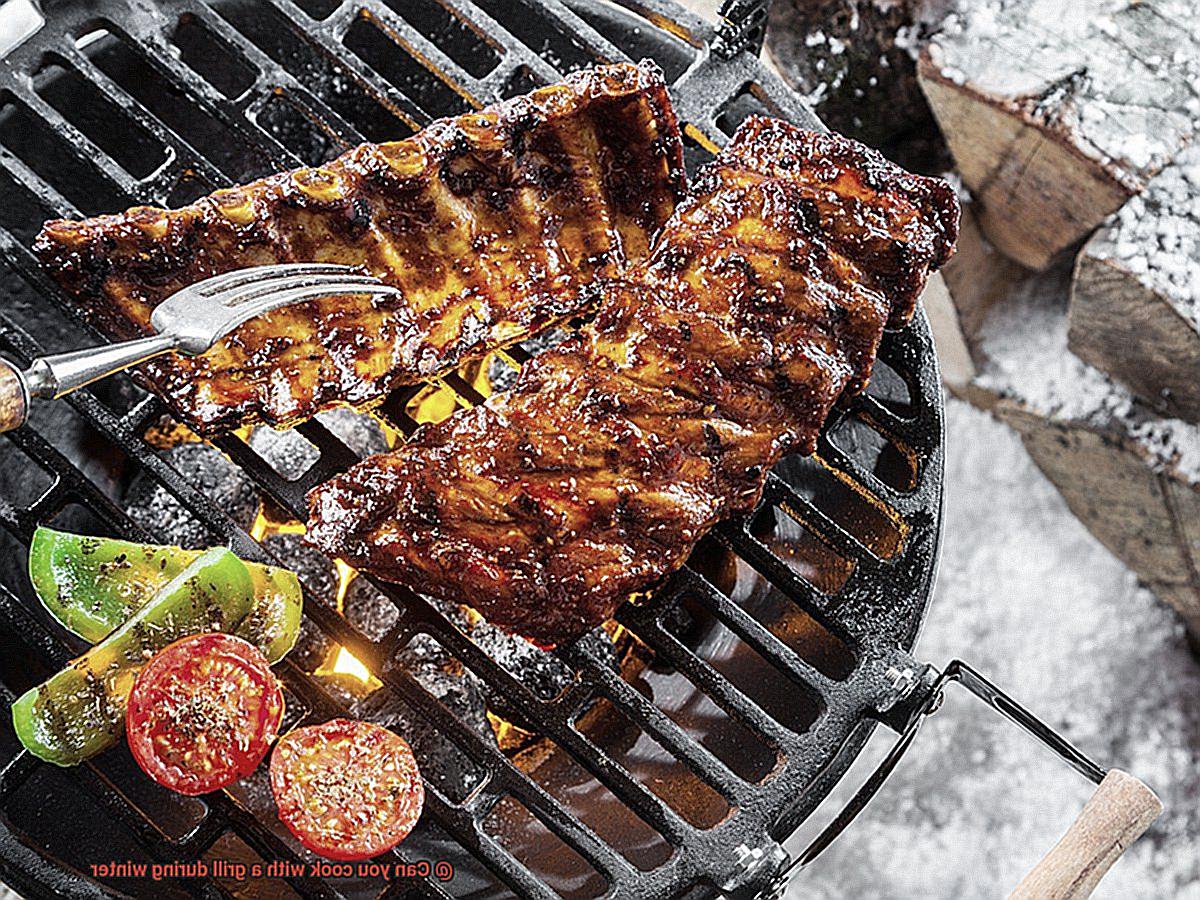
Cooking in windy conditions can also be difficult during winter months. Windy conditions can cause the grill to lose heat quickly, making it challenging to maintain a consistent temperature. To combat this issue, position your grill in an area shielded from the wind or use windbreaks or barriers to protect it from gusts.
Safety should always be top of mind when using a grill, especially during winter months. Ensure that you are using your grill in a safe location away from anything flammable. Using a propane grill in an enclosed space can lead to carbon monoxide poisoning; therefore, ensure that your grill is adequately ventilated and never use it indoors.
In conclusion, despite the challenges presented by winter weather, grilling during winter can be both rewarding and enjoyable with the right preparation and equipment. Below are some tips and tricks to help you overcome these challenges and enjoy some delicious grilled food all year round.
- Invest in high-quality grills with thick cooking grates and lids that retain heat.
- Clear the area around your grill before cooking and invest in durable covers.
- Position your grill in an area shielded from the wind or use windbreaks.
- Ensure that you are using your grill in a safe location away from anything flammable.
- Keep your grill properly ventilated, and never use it indoors.
How to Combat the Cold Weather for Grilling
Grilling during winter can be a thrilling experience, but it comes with its own set of challenges. The cold weather can make it difficult to maintain consistent heat levels, and this can impact the quality of your grilled dishes. To combat the cold weather for grilling, you need to take some measures. Here are five sub-sections that can help you enjoy grilling all year round.
Invest in a Winter-Ready Grill
The first step to successful winter grilling is having the right equipment. Look for a grill that is designed for cold weather use. These grills often have insulation and features like built-in thermometers that can help you monitor the temperature of your grill more effectively. A good winter grill should also have a thick metal construction and good insulation that helps to retain heat, even in cold weather. You may also want to consider getting a grill cover to protect your grill from snow and other winter weather conditions.
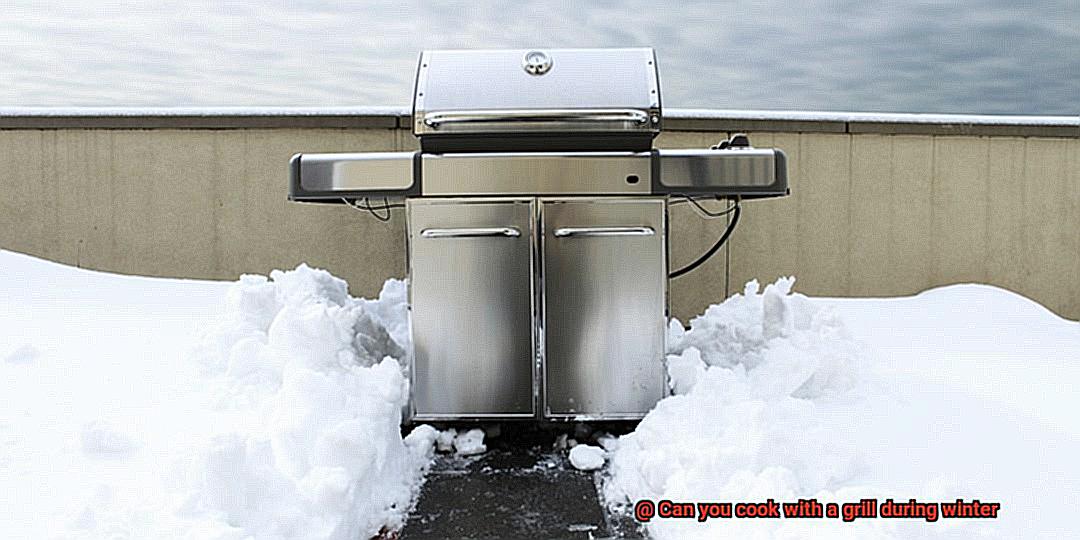
Adjust Your Grilling Techniques
In cold weather, it may take longer for your grill to heat up. Adjust your cooking process accordingly by cooking at lower temperatures for longer periods of time. You may also want to consider using indirect heat or adding more fuel to increase the heat output. In addition, it’s essential to preheat your grill for at least 10-15 minutes before adding food, as this will help bring the temperature up and ensure even cooking.
Choose the Right Fuel Type
Charcoal and wood-fired grills can be more challenging to use in cold weather, as they require more time and attention to maintain a consistent temperature. Gas grills tend to be more user-friendly in cold weather, as they can be easily adjusted to maintain a consistent temperature. However, if you prefer charcoal or wood-fired grills, you can use them during winter by adding more charcoal or wood chips than usual.
Stay Warm While Grilling
It’s crucial to keep yourself warm while grilling outdoors in winter weather. Dress in layers and wear gloves, hats, and other cold-weather gear to stay comfortable while cooking. You may also want to consider investing in a propane heater or other outdoor heating solution to keep you warm while you grill. Additionally, it’s best to set up your grill in a sheltered area if possible to protect yourself from wind and snow.
Monitor Food Temperature
Finally, it’s vital to monitor the internal temperature of your food and ensure that it is cooked safely. Always use a meat thermometer to check the temperature of your food, especially if you’re cooking large cuts of meat. This will help you avoid undercooked or overcooked food and ensure that your grilled meals are safe and delicious.
Investing in Grill Covers and Accessories
Then investing in high-quality grill covers and accessories is a must. Here’s why:
Firstly, protecting your grill from winter weather is critical. Snow, sleet, and other elements can wreak havoc on your grill, leaving it vulnerable to rust and damage. A durable cover made from heavy-duty vinyl or polyester will safeguard your grill from moisture and keep it safe from harm.
Secondly, keeping yourself safe while handling hot grates and other parts of the grill cannot be emphasized enough. A set of heat-resistant gloves or mitts made from materials like silicone or Kevlar are a lifesaver, allowing you to handle those hot items without singeing your hands or fingers.
Thirdly, using drip pans to catch grease and drippings is an excellent way to keep your grill clean and prevent flare-ups. This is especially important during the winter months when regular cleaning can be challenging.
Fourthly, if you use a propane grill, investing in a propane tank cover will protect it from the harsh winter weather. This will help prevent damage to the tank and ensure that it functions properly throughout the season.
Lastly, having grilling tools specifically designed for winter use can make all the difference. Tongs with longer handles that keep your hands away from the heat are essential. They will allow you to cook up delicious grilled dishes even in the coldest of temperatures.
Preparing Your Grill Before Cooking
Preparing your grill before cooking is a crucial step to ensure your food is cooked safely and deliciously. As an expert in preparing grills before cooking, I’ve compiled some essential steps that you need to follow to ensure that your food is cooked to perfection and your grill is safe to use during the winter months.
Step 1: Scrub away the grime
Before you start cooking, you’ll need to clean your grill thoroughly. Use a grill brush or scraper to remove any debris or leftover food from the grates. Then, use warm soapy water and a sponge or cloth to wipe down the grates and interior of the grill. Rinse the grill with water and dry it with a towel.
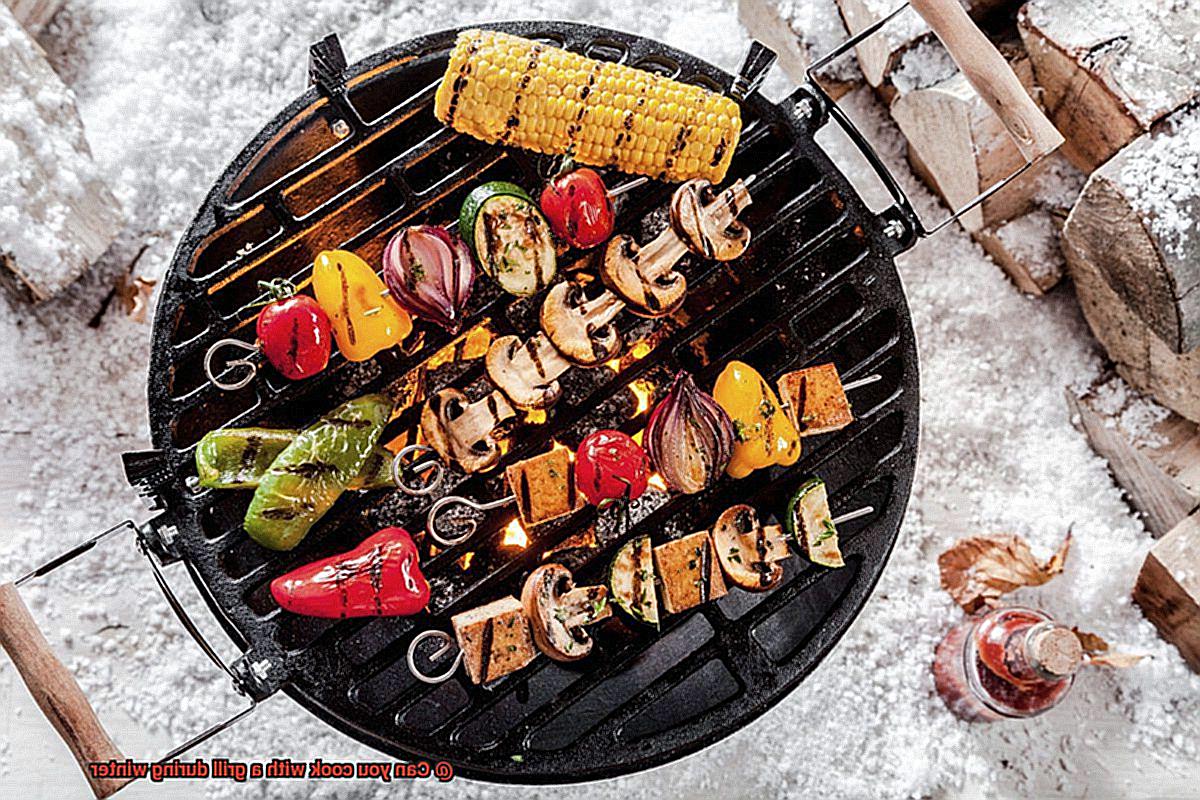
Step 2: Stock up on fuel
During the winter months, you’ll need more fuel than usual to maintain a consistent temperature. So, make sure you have enough propane or charcoal on hand before starting cooking.
Step 3: Check for leaks (for propane grills)
If you’re using a propane grill, it’s crucial to check the hoses and connections for any leaks. You can do this by applying a solution of soap and water to the connections and turning on the gas. If you see bubbles forming, that indicates a leak, and you should replace the hose or connection before using your grill.
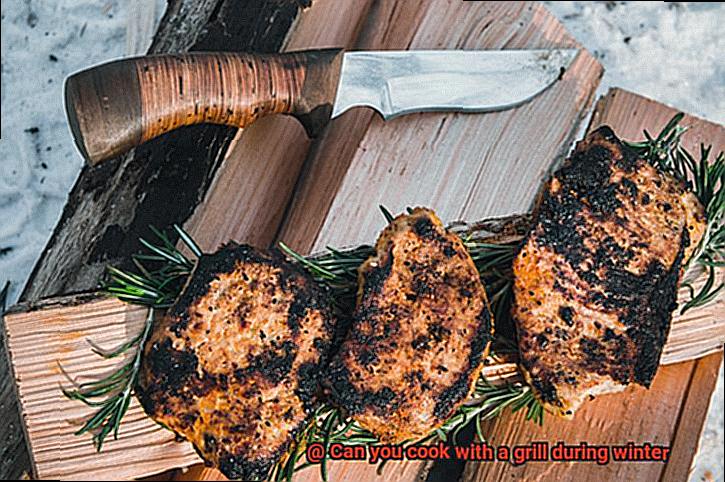
Step 4: Keep the heat in with insulation
Adding insulation can help maintain a consistent temperature and prevent heat from escaping. You can purchase insulating blankets specifically designed for grills or make your own using materials like fiberglass insulation or fireproof fabric.
Bonus Tip: Season the grates
Before cooking, be sure to season your grill grates with oil or cooking spray. This will prevent sticking and ensure delicious char marks on your food.
Tips for Cooking in Cold Weather
Grilling during the winter months can be a challenge, but with a few tips and tricks, you can still enjoy delicious grilled meals. Here are some ways to successfully cook with a grill in cold weather:
Preheat your grill
Preheating your grill is essential to ensure that it reaches the desired temperature. In cold weather, it may take longer for your grill to heat up, so make sure to give it at least 10-15 minutes before cooking.
Use a thermometer
Using a meat thermometer is crucial when cooking in cold weather. The temperature outside can affect the temperature of your grill, so using a thermometer will ensure that your food is cooked to the correct temperature and is safe to eat.
Keep the lid closed
Keeping the lid closed on your grill is important to maintain the temperature inside. Opening the lid frequently can cause heat loss and make it more difficult to cook your food properly.
Use a windbreak
Wind can have a significant impact on the temperature of your grill, especially in cold weather. Using a windbreak like a piece of plywood or sheet of metal can help protect your grill and keep it at the desired temperature.
Choose the right fuel
The type of fuel you use can affect how well your grill performs in cold weather. Charcoal grills may take longer to heat up, while propane grills may require more fuel to maintain their temperature. Choose the right fuel for your grill to ensure it heats up properly.
In addition to these tips, there are a few other things you can do to make grilling in cold weather easier. First, make sure to clean and maintain your grill regularly, even during the winter months. This will help ensure that it functions properly and reduce the risk of accidents.
Another helpful tip is to use a cast-iron skillet or griddle on top of your grill grates. This will help retain heat and keep your food warm while you finish cooking other items.
How to Ensure Food is Cooked Thoroughly
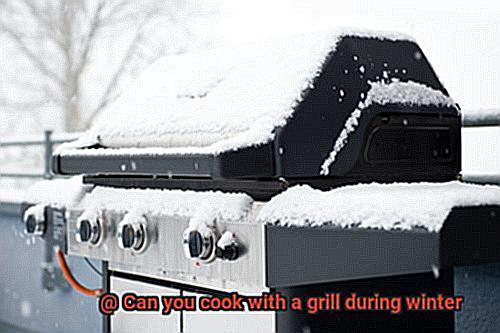
Grilling in the winter can be a festive and exciting experience, but ensuring that your food is cooked thoroughly can be a challenge. Here are five tips to ensure you grill safely and successfully during the cold season:
Invest in a Meat Thermometer
A reliable meat thermometer is essential to ensure that the internal temperature of your food reaches a safe level. During winter, the outside temperature can impact the cooking time of your food, so it’s important to use a thermometer to check that your food has reached a minimum temperature of 165°F for poultry and 145°F for beef, pork, and lamb.
Preheat Your Grill
Preheating your grill for an extended period before adding any food is key to making sure the grates are hot enough to sear the food and prevent sticking, which can lead to unevenly cooked dishes or undercooked meat.
Use Indirect Heat
Using indirect heat is a great way to ensure that your food is cooked evenly. This method involves placing the food away from the direct flames and instead cooking it by the heat radiating off the flames. This will reduce the risk of burning or undercooking and give you deliciously grilled meals every time.
Keep the Grill Lid Closed
Keeping the grill lid closed as much as possible helps maintain a consistent temperature, preventing heat loss and ensuring that your food cooks evenly. Frequent opening of the lid can cause temperature fluctuations, which can result in undercooked or overcooked dishes.
Allow Enough Cooking Time
Giving your food enough time to cook thoroughly is crucial. Be patient and plan ahead by starting your grill early enough to allow for proper cooking time. Rushing it can lead to undercooked meat or other potential health risks.
LGLk6tqoZrg” >
Conclusion
To sum it up, the answer to the question “Can you cook with a grill during winter?” is a resounding YES. Winter grilling has been gaining popularity in recent years, and for good reason. It’s the perfect opportunity to add some excitement to your cooking routine, bond with loved ones over stories and memories, and savor delicious grilled food all year round.
However, grilling during winter poses its own set of unique challenges. The chilly weather can make it challenging to maintain consistent heat levels, manage snow and ice buildup on the grill, and cook in blustery conditions. Nevertheless, with some preparation and the right equipment, you can overcome these obstacles.
Investing in a winter-ready grill, adapting your grilling technique to suit cold weather conditions, selecting the appropriate fuel type, keeping yourself warm while grilling, monitoring food temperature closely using a meat thermometer, utilizing grill covers and accessories effectively, preparing your grill before cooking by cleaning it thoroughly and oiling the grates are all essential steps that will help you conquer any challenges that come your way while grilling in winter.
So don’t let the cold weather stop you from enjoying mouth-watering grilled meals throughout the winter season.

